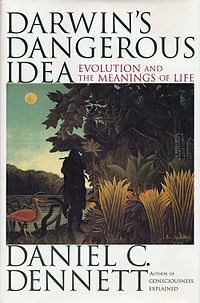
Darwin's Dangerous Idea: Evolution and the Meanings of Life is a 1995 book by Daniel Dennett, in which the author looks at some of the repercussions of Darwinian theory. The crux of the argument is that, whether or not Darwin's theories are overturned, there is no going back from the dangerous idea that design might not need a designer. Dennett makes this case on the basis that natural selection is a blind process, which is nevertheless sufficiently powerful to explain the evolution of life. Darwin's discovery was that the generation of life worked algorithmically, that processes behind it work in such a way that given these processes the results that they tend toward must be so.
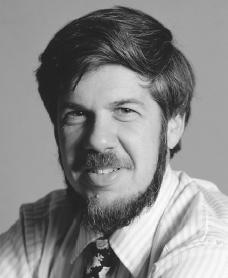
Stephen Jay Gould was an American paleontologist, evolutionary biologist, and historian of science. He was also one of the most influential and widely read authors of popular science of his generation. Gould spent most of his career teaching at Harvard University and working at the American Museum of Natural History in New York. In 1996, Gould was hired as the Vincent Astor Visiting Research Professor of Biology at New York University, where he divided his time teaching there and at Harvard.

The Mismeasure of Man is a 1981 book by paleontologist Stephen Jay Gould. The book is both a history and critique of the statistical methods and cultural motivations underlying biological determinism, the belief that “the social and economic differences between human groups—primarily races, classes, and sexes—arise from inherited, inborn distinctions and that society, in this sense, is an accurate reflection of biology”.

A Devil's Chaplain: Reflections on Hope, Lies, Science, and Love is a 2003 book of selected essays and other writings by Richard Dawkins. Published five years after Dawkins's previous book Unweaving the Rainbow, it contains essays covering subjects including pseudoscience, genetic determinism, memetics, terrorism, religion and creationism. A section of the book is devoted to Dawkins' late adversary Stephen Jay Gould.

Wonderful Life: The Burgess Shale and the Nature of History is a 1989 book on the evolution of Cambrian fauna by Harvard paleontologist Stephen Jay Gould. The volume made The New York Times Best Seller list, was the 1991 winner of the Royal Society's Rhone-Poulenc Prize, the American Historical Association's Forkosch Award, and was a 1991 finalist for the Pulitzer Prize. Gould described his later book Full House (1996) as a companion volume to Wonderful Life.

Dinosaur in a Haystack (1995) is the seventh volume of collected essays by the Harvard paleontologist Stephen Jay Gould. The essays were culled from his monthly column "The View of Life" published in Natural History magazine, which Gould contributed for 27 years. The book deals with themes familiar to Gould's writing: evolution, science biography, probabilities, and strange oddities found in nature.
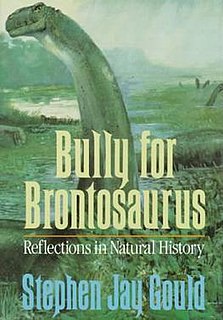
Bully for Brontosaurus (1991) is the fifth volume of collected essays by the Harvard paleontologist Stephen Jay Gould. The essays were culled from his monthly column "This View of Life" in Natural History magazine, to which Gould contributed for 27 years. The book deals, in typically discursive fashion, with themes familiar to Gould's writing: evolution and its teaching, science biography, and probabilities.
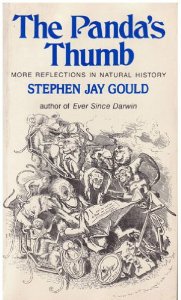
The Panda's Thumb: More Reflections in Natural History (1980) is a collection of 31 essays by the Harvard University paleontologist Stephen Jay Gould. It is the second volume culled from his 27-year monthly column "This View of Life" in Natural History magazine. Recurring themes of the essays are evolution and its teaching, science biography, probabilities and common sense.
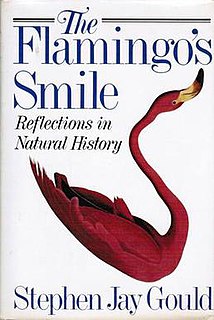
The Flamingo's Smile: Reflections in Natural History, published in 1985, is the fourth volume of collected essays from evolutionary biologist and well-known science writer Stephen Jay Gould; the essays were culled from his monthly column The View of Life in Natural History magazine, to which Gould contributed for more than two decades. The book deals, in typically discursive fashion, with themes familiar to Gould's writing: evolution and its teaching, science biography, probabilities and common sense.

An Urchin in the Storm is a 1987 essay collection from paleontologist and science writer Stephen Jay Gould.

Eight Little Piggies (1993) is the sixth volume of collected essays by the Harvard paleontologist Stephen Jay Gould. The essays were selected from his monthly column "The View of Life" in Natural History magazine, to which Gould contributed for 27 years. The book deals, in typically discursive fashion, with themes familiar to Gould's writing: evolution and its teaching, science biography, probabilities and common sense.
The Panda's Thumb may refer to:
The Panda's Thumb is a blog on the creation–evolution controversy from a mainstream scientific perspective. In 2006, Nature listed it as one of the top five science blogs, and Mark Pallen has called it "the definitive blog on the evolution versus creationism debate".
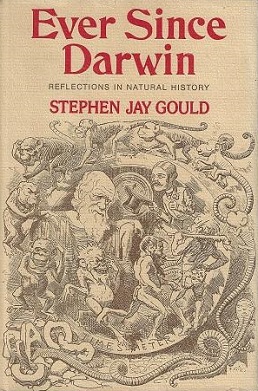
Ever Since Darwin is a 1977 book by the paleontologist Stephen Jay Gould. Gould's first book of collected essays, it originated from his monthly column "This View of Life," published in Natural History magazine. Edwin Barber—who was then the editorial director for W. W. Norton & Company— encouraged Gould to produce a book. He soon commissioned Gould to write The Mismeasure of Man, but it was not until three years later, when Gould accumulated 33 columns, that it occurred to either of them that the Natural History columns should be published in a single volume. The collection of essays, written between 1973–1977, became a best-seller and propelled Gould to national prominence.
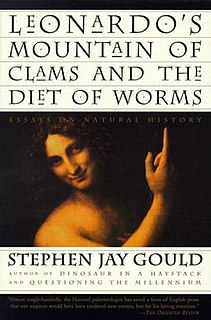
Leonardo's Mountain of Clams and the Diet of Worms (1998) is the eighth volume of collected essays by the Harvard paleontologist Stephen Jay Gould. The essays were culled from his monthly column "The View of Life" in Natural History magazine, to which Gould contributed for 27 years. The book deals, in typically discursive fashion, with themes familiar to Gould's writing: evolution and its teaching, science biography, probabilities and common sense.

Hen's Teeth and Horse's Toes (1983) is Stephen Jay Gould's third volume of collected essays reprinted from his monthly columns for Natural History magazine titled "This view of life". Three essays appeared elsewhere. "Evolution as Fact and Theory" first appeared in Discover magazine in May 1981; "Phyletic size decrease in Hershey bars" appeared in C. J. Rubins's Junk Food, 1980; and his "Reply to critics", was written specifically for this volume as a commentary upon criticism of essay 16, "The Piltdown Conspiracy".

I Have Landed (2002) is the 10th and final volume of collected essays by the Harvard paleontologist Stephen Jay Gould. The essays were culled from his monthly column "This View of Life" in Natural History magazine, to which Gould contributed for 27 years. The book deals, in typically discursive fashion, with themes familiar to Gould's writing: evolution and its teaching, science biography, probabilities and common sense.

Rocks of Ages: Science and Religion in the Fullness of Life is a 1999 book about the relationship between science and religion by the Harvard paleontologist Stephen Jay Gould. First published by Ballantine Books, it was reprinted by Vintage Books. The book is a volume in the series, The Library of Contemporary Thought.
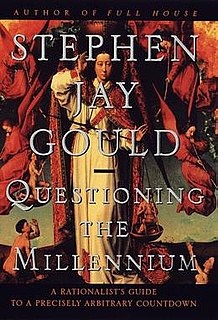
Questioning the Millennium is a 1997 book by the paleontologist Stephen Jay Gould that deals with the definition and calculation of the millennium, and its meaning in Western culture. New York Times reviewer Robert Eisner described it as a "slim and attractive meditation," which touches upon calendrics, Biblical exegesis, millennial cults, and includes "a charming essay on a young autistic man whose amazing ability to calculate instantly which day of the week coincided with any date mentioned over many centuries". Gould reveals that this young man was his autistic son, Jesse.

Ontogeny and Phylogeny is a 1977 book on evolution by Stephen Jay Gould, in which the author explores the relationship between embryonic development (ontogeny) and biological evolution (phylogeny). Unlike his many popular books of essays, it was a technical book, and over the following decades it was influential in stimulating research into heterochrony, changes in the timing of embryonic development, which had been neglected since Ernst Haeckel's theory that ontogeny recapitulates phylogeny had been largely discredited.



















